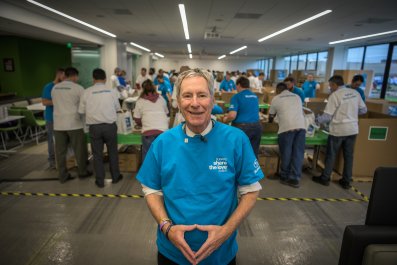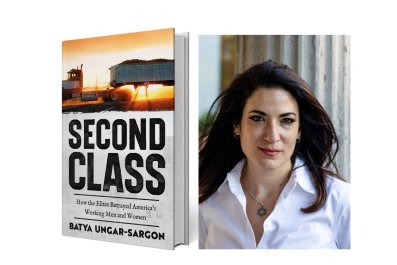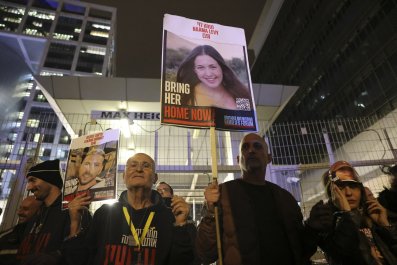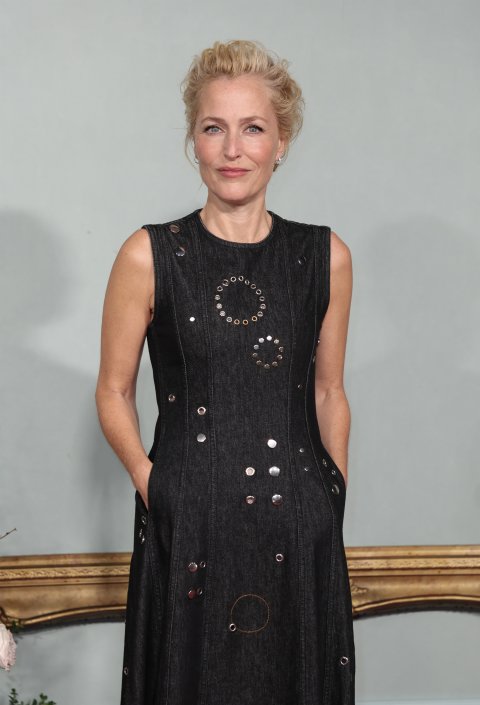
"The decision to do [Scoop] had so much more to do with would I have the balls to play Emily Maitlis?"
If there's one thing that's true about Gillian Anderson, it's that she isn't afraid of a challenge. And that's exactly what she's doing in her new film, tackling the role of journalist Emily Maitlis in Netflix's Scoop (April 5), which documents the team behind the bombshell 2019 BBC interview with Prince Andrew over his involvement with Jeffrey Epstein. For Anderson, who won an Emmy for playing Margaret Thatcher in The Crown, she didn't see it as another project about the royal family. "It wasn't until afterwards when people started asking me that and I was like, 'Really? Well, I didn't even think about it.'" [laughs] What stood out to Anderson was the various portrayals of women involved in making the interview happen. "They are all incredibly powerful forces in their own rights, but also completely unique and different characters." Anderson, whose legions of fans date back to her days on The X-Files, is using that popularity to talk about women's sexual health with her new energy drink line G Spot, targeted for women, but made for everybody.
SUBSCRIBE TO THE PARTING SHOT WITH H. ALAN SCOTT
ON APPLE PODCASTS OR SPOTIFY
Editor's Note: This conversation has been edited and condensed for publication.
Did you have any reservations about doing another film that revolves around the royal family?
What's so funny is that I've had people reminding me that this has something to do with the royals. When I first took it on, even though obviously it's a big part of the story, to me that's not the big part of the story. And yes, we are talking about two old establishments in the U.K. and one of those establishments is a royal family, but [one] involves a prince. The decision to do it had so much more to do with would I have the balls to play Emily Maitlis, who is, at least over here [in the U.K.], is so much a part of our consciousness. Not least her podcast, which I was already listening to pretty much on a daily basis, but also her history with the BBC and how she left the BBC. I wasn't even thinking, '"Oh, it's another story that involves the royal family," because so much of it is all in the BBC. It's all in the show. Except for those couple of scenes [for] the big interview, which obviously is in a wing of Buckingham Palace. It wasn't until afterwards when people started asking me that and I was like, "Really? Well, I didn't even think about it." [laughs] That's compartmentalization.
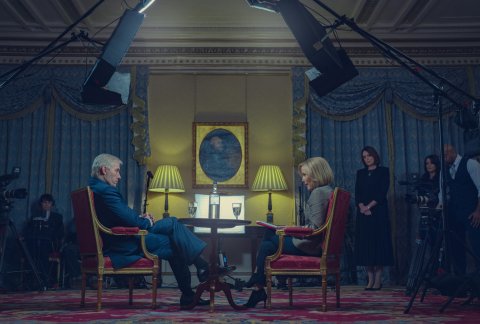
One of the main elements of this film is the interview. How do you put your personal stamp on it when everyone has watched this video?
How do you tell this story, period? When everybody knows the end result? Right? I really feel like they figured out how to do that and it felt evident even in the script. It felt new and fresh and propulsive, very much like a thriller. And so for me, as much as anything it was about finding out whether I thought that the director, in speaking to him about it, would be able to create as muscular, thriller-type story as I was reading on the page. Because those two things don't necessarily come to fruition. What you see when you sit down in the movie theater is what you were imagining, it might be based on what you read and is not always the case. So, I was a big fan of Peter Moffat's writing.
Emily as a character is very interesting. We know so much of her work, but we also see her having to balance the journalism with the impact her persona will have on the story. She's just as much part of the story, in a way. Did that stand out to you?
Once I started doing the research and I went back to look at the interview from a different perspective, I was impressed with how gentle she was with him at the beginning. I mean, obviously, she eventually leans in quite heavily, but she starts very gentle. She's fierce, particularly with politicians and holding authority to account, but there was strategy, whether that was her own strategy or Sam McAlister's—this is Sam's version of events. There was a rehearsal over a three-day period, how the questions we're going to be asked, and the tone to take and the degree to which his level of privilege would influence his answers or how he perceived her or how he perceived the questions. One of the things that they discussed was about the degree to which he is so used to being right and being listened to and not interrupted that you could use that knowledge of how he will likely respond based on that to track your path toward getting him to actually answer the questions. Because at any moment he could have walked away, right at any moment if she pushed too hard or seemed disrespectful. At any point he could have said, "Forget this, I'm not doing you this favor anymore."
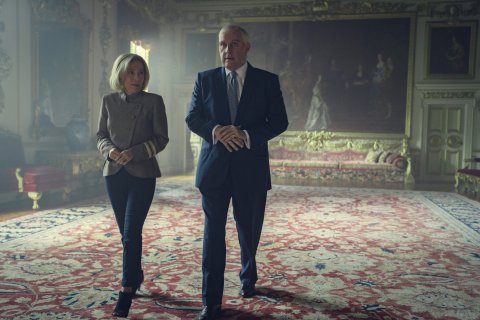
What struck me were the women at the center of this story, Maitlis and McAlister in particular. Two women holding accountable the men in positions of power. Did that have an impact on you?
It definitely feels to me like it stands out more in the film than I had necessarily noticed it on the page. That is interesting, and I'm glad that that stands out. But by the same token, one thing I really love about the script is the degree to which you have all of these women and they are all incredibly powerful forces in their own rights, but also completely unique and different characters, their personalities are incredibly different and well-drawn. Some of that is obviously really good casting, but also in the dialogue, you feel like everybody has a unique perspective.
You have a pattern of playing unique women who are badass in their own particular way. Whether it be Dana Scully on The X-Files or Margaret Thatcher or Stella Gibson in The Fall or Jean Milburn in Sex Education and now Emily Maitlis. How do you choose your roles, and is being badass intentional?
People generally come to me with stuff that they would imagine I might be interested in playing and I think, not that I'm necessarily typecast in a way, because I don't feel like I am, but now what people are coming to me with are presidents of the United States and stuff. [laughs] I've been incredibly lucky in terms of what has come my way. And a lot of it is, no doubt, it's the same person over the years making the decisions, so therefore the common denominator is me saying "yes" or "no" to things. And it's clear that I'm more likely to say yes to something if it feels like it's more three dimensional or complex or whatever, but certainly, you could put badass on there as well; that's probably something that I lean more toward than another adjective.
I mean, whenever I'm watching your stuff, I'm just like, "She's badass."
It's very interesting for people to read the scripts before to see whether they actually contain any badass or whether I've just forced them into that.
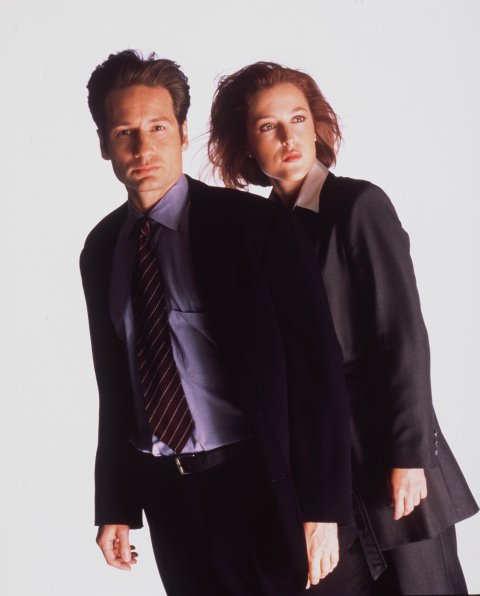
I've been a fan for a long time, and I feel like as a fan, we all have that one series of yours we're dying for more of. For me, it's The Fall. For others it's X-Files, among others. How does that feel, that us fans frankly can't get enough of you?
I guess that to a certain extent that proves how lucky I've been, to be able to be a part of some of these iconic shows like The X-Files. I certainly feel like we answered that call from the fanbase ad nauseam. By the end we kept coming back and coming back, and I feel like we definitely showed up for that.
With The Fall, it's something that I think we all were interested in, potentially having at least one more season. Or a character like Stella feels like a character that you could drop into at any stage, and I don't necessarily feel that it's completely done. We did try for a fourth [season] at one point, we were toying with various things. Allan Cubitt, the writer and showrunner, was playing around [with it] for a while and I'm not sure what the at the end of the day [happened], but I particularly get it with her and feel the same way. Even though it's stalled at the minute, that doesn't mean it can't happen in the future. That is an example of a script and a project that was really unique in a way, just the quality of the writing. I think those characters, in my experience, only come around once a decade.
But to your point in terms of my fans, over time [they] have really followed my journey, and it's amazing. I'm incredibly grateful. Also, they seem to embrace pretty much whatever the decision it is that I make, whether it's TV or film or even theater. They show up very often, over and over again to see plays that I do and so I feel very lucky to have such a long-lasting fan base. And also that there seems to be more people still discovering X-Files and people discovering Dr. Jean [Milburn from Sex Education] and that's a new kind of fan base. And I'm getting more involved in other areas. I've got a drinks brand now and that's growing into various other things. So it feels like I'm being told what it is in a way that the fan base is...what is this that they want and they expect. Now that I'm in conversations with brand specialists, these questions are being asked, they're doing research, which I've never done in my life on my own. But people are coming back to me saying, "This is what they say out there. This is what they expect. This is who they are. These are the age ranges." That's all new to me. But it's great, it's all positive.
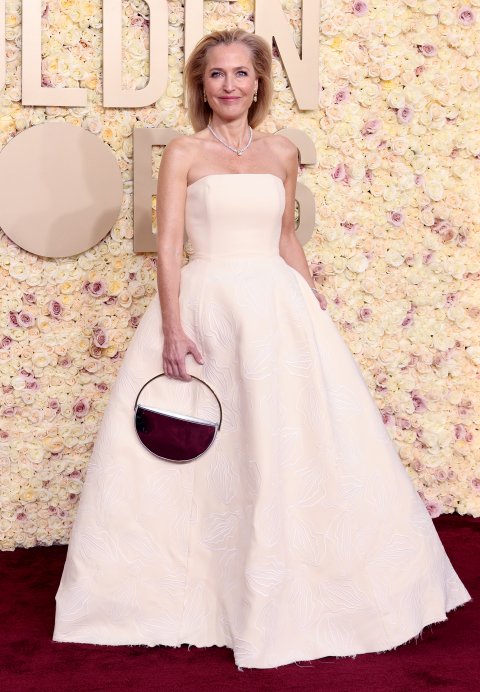
You have been going viral lately, what with your red-carpet fashions, your Instagram and now your drink brand. Did you ever see yourself as such a social media darling
On the on the one hand, [I'm] becoming aware of it really for the first time in the last year since the drink has launched. And since I've started to talk to various people about how to grow it. We're bringing it into the States. But those are the kind of conversations not just that I haven't had, but I haven't ever wanted to have. So, it's taken other people to kind of turn me around by the shoulders and say, "Look at this. Pay attention to what the potential is here." Because people on the one hand seem to be really drawn to the characters that I play for one, right? So starting to look at what is it about these particular characters that makes people say, create a bumper sticker that says, "What would Stella do?" Right? So, what is that? What are they getting here? And not just through characters, but in other ways. Can we find ways to answer that? Because the fan base, because of X-Files, and because of Jean Milburn, and because the demographic is so wide that's inclusive of everybody. We're not just a drinks brand, we're not just focusing on women, per se. Yes, there needs to be more healthy drinks that are skewed toward women, particularly energy drinks, because so many of them are so not very good for you. But there's also equity and diversity and inclusion. There are so many things that when the brand people say, "Okay, these are the things that you seem to represent, why not take advantage of those things to create something that makes people want to come because they feel safe and represented and respected, and that there's a platform to share there?" So that's where we're headed.
Well, I think that also has to do with this badass thing, people want to feel part of that, whatever the energy is that you're putting out there, which is why I want the drink here in the States.
But what's interesting is they're responding to it as if it's something that's out there. And what we're trying to have the conversation about is to what degree it already exists inside you. So that's the thing. It's not me. It's not the characters. That exists already inside you.
I'm leaving this interview feeling like I'm badass now. [laughs] I need to ask you about your forthcoming book Want. What struck you as most poignant in collecting these essays from women?
The degree to which women are very often afraid to express what it is that they want to their partners, particularly in bed in an intimate way and in a special way that many women—I won't say the majority—but I feel like it was a very large percentage when we did the poll. Women are more likely to reach climax separate from their partners because they don't want to waste his or her time, or they don't want to feel like it takes too long. They don't know how to share with them what they want. I'm interested in that because I think that's fascinating. So that also surprised me in these letters, the degree to which women wrote about that.














